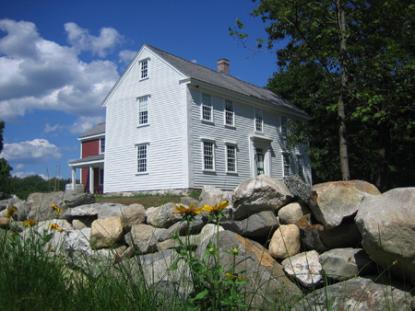
Henry David Thoreau’s birthplace in Concord opened to the public this past June for the first time in its history. This momentous achievement was the result of fifteen years of hard work and determination by the Thoreau Farm Trust, which helped to save the site from development. The Trust’s subsequent $1 million project completely restored and rehabilitated the house and surrounding landscape, which had fallen into severe disrepair.
Those of us who had spearheaded this effort were focused for so long on this goal that it almost surprised us when we realized our dream was on the verge of becoming a reality. At that point, we asked ourselves: what next?
We had a vague mission statement about preserving the house and using the site for “educational purposes” and for the “benefit of the public.” But what did those things really mean? How exactly were we going to interpret the house for visitors?
This question took center stage as we embarked on a strategic planning process to guide our transition from the capital campaign and construction phase to ongoing operation of the site.
We considered several issues carefully. First, Thoreau spent less than a year at the house where he was born. We didn’t possess any objects associated with Thoreau or his family. Thoreau was a forward-thinking man and someone who shunned material things. Did it make sense to keep his house fixated in the past and fill it with things? What did the house really represent?
Second, Concord is already home to several traditional historic house museums—Orchard House, the Wayside, Emerson House, and the Old Manse. All are outstanding sites; did Concord really need another? We wanted to differentiate ourselves and offer a unique experience. In addition, the sustainability of historic house museums has become a hot topic in the field—visitation and financial support are reportedly waning. With this in mind, we needed to think about our long-term survival.
Third, we thought about our potential audience—who would come? The house has been visited by Thoreau enthusiasts from around the world since the 1880s, despite the fact that it was always privately owned until now. Why do these pilgrims come and what are they looking for? How could we attract and engage all types of visitors?
The concept of Thoreau’s birth house as a “birthplace of ideas” evolved from the discussion of these issues. Thoreau’s ideas are his legacy. They continue to inspire and resonate nearly 150 years after his death. John Muir, Martin Luther King, Jr., Gandhi, and countless others have used Thoreau’s ideas to improve or change the world for the better, on both a large and small scale. Thus, our new mission statement became:
Thoreau Farm believes that Henry David Thoreau’s extraordinary ideas about life, nature, and social responsibility are as relevant today as they were in his lifetime. We will preserve his birthplace as a source of inspiration for living deliberately, practicing simplicity, and exploring new ideas for positive change.
We developed a core exhibit reflecting this philosophy at the site (generously funded by Mass Humanities, the National Trust for Historic Preservation, and the Sudbury Foundation). Interpretive panels provide context about Thoreau’s life but are primarily written in the first person, using Thoreau’s words in particular to speak directly to the visitor. Interpretation is designed to engage the visitor in considering Thoreau’s ideas, and to think about their own values and how they live their lives. We invite visitors to stay and read, meditate, or write in their own journals. This core exhibit will be used as a springboard for us to develop additional interpretive activities and programs for various audiences.
We believe Thoreau Farm offers a different kind of visitor experience that’s consistent with who Thoreau was and what he lived for. Perhaps Thoreau himself best sums up what we hope visitors take away from his birthplace:
“I would not have any one adopt my mode of living on any account; for, beside that before he has fairly learned it I may have found out another for myself, I desire that there may be as many different persons in the world as possible; but I would have each one be very careful to find out and pursue his own way, and not his father’s or his mother’s or his neighbor’s instead.” (Walden, “Economy”)
~~~
Thoreau Farm is located at 341 Virginia Road, Concord. Open Saturdays and Sundays through October. Guided tour at 11 a.m. ($4), self-guided tours noon-4 p.m. (free). Guided and group tours can also be arranged by appointment. For more info, please contact us at 978.369.3091 or thoreaufarm.org.
Photo: Courtesy of the Thoreau Farm Trust

